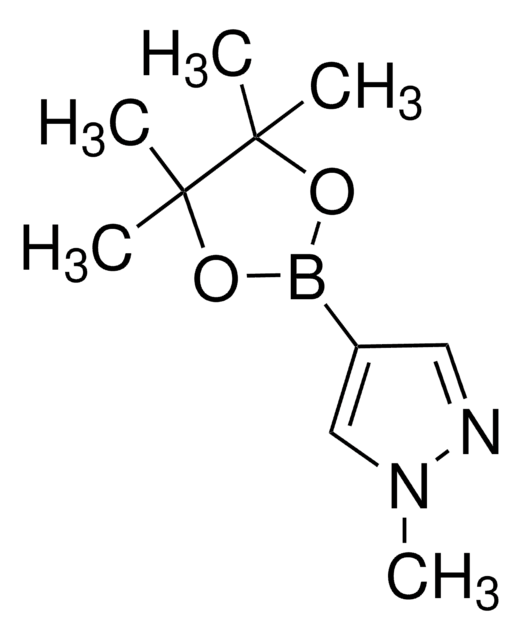All Photos(1)
About This Item
Empirical Formula (Hill Notation):
C11H11NO3
CAS Number:
Molecular Weight:
205.21
MDL number:
UNSPSC Code:
12352100
PubChem Substance ID:
NACRES:
NA.22
Recommended Products
Quality Level
assay
99%
mp
140-142 °C (lit.)
functional group
ester
SMILES string
COC(=O)c1cc2c(OC)cccc2[nH]1
InChI
1S/C11H11NO3/c1-14-10-5-3-4-8-7(10)6-9(12-8)11(13)15-2/h3-6,12H,1-2H3
InChI key
GLCZQTLCVLVFGV-UHFFFAOYSA-N
General description
Methyl 4-methoxy-2-indolecarboxylate is an indole derivative.
Application
- reactant in [3+2] annulation reactions
- reactant in preparation of inhibitors of mammalian secreted phospholipases A2
- reactant in Heck reactions
- reactant in preparation of indole fatty alcohol derivatives
- reactant in methylation reactions
Methyl 4-methoxy-2-indolecarboxylate is suitable for use in the production of dyes by Escherichia coli expressing naphthalene dioxygenase (NDO) and toluene dioxygenase (TDO). It is also suitable for use in the production of dyes by E. coli expressing multicomponent phenol hydroxylase (mPH) from Pseudomonas sp. strains KL33 and KL28.
Storage Class
11 - Combustible Solids
wgk_germany
WGK 3
flash_point_f
Not applicable
flash_point_c
Not applicable
Choose from one of the most recent versions:
Already Own This Product?
Find documentation for the products that you have recently purchased in the Document Library.
J Y Kim et al.
Letters in applied microbiology, 36(6), 343-348 (2003-05-20)
To isolate and characterize the phorate [O,O-diethyl-S-(ethylthio)methyl phosphoradiothioate] degrading bacteria from agricultural soil, and their assessment for multifarious biological activities of environmental and agronomic significance. Based on their morphological and biochemical characteristics, the selected isolates PS-1, PS-2 and PS-3 were
J Y Kim et al.
Letters in applied microbiology, 41(2), 163-168 (2005-07-22)
To establish multicomponent phenol hydroxylases (mPHs) as novel biocatalysts for producing dyestuffs and hydroxyindoles such as 7-hydroxyindole (7-HI) from indole and its derivatives. We have isolated Pseudomonas sp. KL33, which possesses a phenol degradation pathway similar to that found in
Our team of scientists has experience in all areas of research including Life Science, Material Science, Chemical Synthesis, Chromatography, Analytical and many others.
Contact Technical Service








